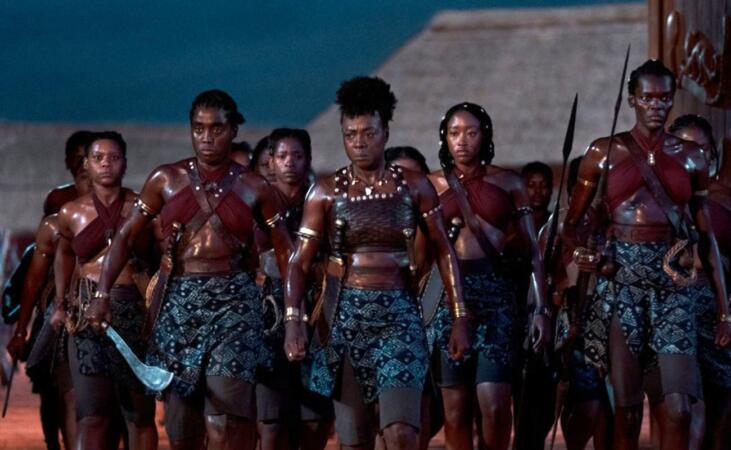As Gina Prince-Bythewood’s historical epic, The Woman King, opens, a statuesque Black woman emerges from blades of tall grass. Clad in cowrie shells and coated in oil, she looks fearlessly out into the open plane before raising her fist and calling out into the darkness — a crop of similarly dressed Black women emerging behind her. And with that sound, a film centering on Black womanhood and the power of choice begins at a rip-roaring pace.
Set in 1823 in the robust lands of Dahomey, West Africa — now called Benin, Prince-Bythewood introduces her audience to an illustrious kingdom. King Ghezo (John Boyega) has just ascended the throne, taking over for his brother. Though Dahomey is a pleasant and peaceful place, the ongoing slave trade with the Americans and Europeans continues to be a sore point among the citizens. The terror and barbarism of enslavement and the patriarchal structure of the society, along with the nearby dominating tribe called the Oyo, rings loudly. Dahomey owes its safety to General Nanisca (an enraptures Viola Davis), who leads her all-women army, the Agojie,
Stern and unyielding, Nanisca demands excellence among her ranks, which range from her lieutenants, Amenza (Sheila Atim) and Izogie (Lashana Lynch), to a motley crew of new recruits
Nawi (Thuso Mbedu) is one of those newcomers dropped on the doorsteps of the palace by her bitter father, who no longer has the patience to try to marry her off.
While many of the women in this society, the Agojie included, play their positions, Nawi has her own ideas about life. Though she’s small in stature, she arrogantly unafraid, bold, and brash. She is determined to become Agojie, but her road to becoming a warrior will be hard-won.
A layered film about humanity, sisterhood, change, and facing the past, Prince-Bythewood uses every arsenal in her tool belt to deliver an astounding piece of cinema. Everything about The Woman King is deliciously enthralling, from the viciously fought battles to the glittering light on the varied tones of dark brown skin.
Davis is masterful, as she always is, but Mbedu's Nawi and Lynch's Izogie win our hearts in this narrative.
From Nawi’s defiance to Izogie’s humor, these women have made a stance for themselves during a time when that seemed almost impossible. In addition to the richness of the action, the Love & Basketball director’s careful handling of very challenging subject matters, including sexual violence and death, is why more women and certainly more Black women need to be at the helm of our stories.
While The Woman King is certainly near perfect, from the costuming and styling to the intriguing narrative, the accents sometimes do get tricky. While Mbedu, who is South African born, and Boyega, as the charismatic young king, mastered their West African accents, others force the audience to lean more heavily into their respective imaginations.
Yet, the sometimes choppy accents take nothing away from the pure majesty of The Woman King and its display of Black sistership and womanhood. Men orbit around the Agojie, and there is even a sliver of romance, but the women’s real strength lies in their bonds with one another.
Black women are constantly told how we should be and act.
We are first called “too masculine,” and then we’re told we’re asking too much when we demand protection from the people who try to “lead” our community. In The Woman King, we don’t have to choose. There is a gorgeous balance in the masculine and feminine duality that exists not just in the Agojie but in everyone. Nanisca learns that fear isn’t a weakness, while Nawi realizes that vulnerability and intimacy don’t make you any less fearsome. There is power in laughter, a hug, a joke, or a word of affirmation, especially when it comes from your sister.
The Woman King is one of those rare films that lean into the foundation of classic cinema but is still very much a film for now. As women in the 21st century continue to fight desperately for their rights, Prince-Bythewood, Davis, and the Agojie remind us that standing together and obliterating sexism and oppression is the only way forward. It’s something Black women across the diaspora have been doing for generations.
The Woman King premiered Sept 9. 2022 at the Toronto International Film Festival. The film will debut in theaters Sept. 16.

